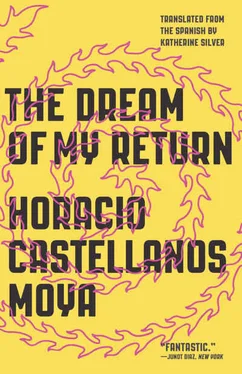Again and suddenly, I felt thirsty, because even though the memory of Tamba’s story as Héctor had told it to me had managed to extricate me from the distress produced by the memory of that terror, my hangover was still there, pressing in on my temples and constricting my throat, extracting a high price for my binge the night before. I wrapped the towel around my waist and went down to the kitchen to drink some more water and make fried eggs and more coffee, lamenting the fact that there wasn’t even one goddamn beer in that fridge and that the Coca-Cola had already gone flat and telling myself that the best thing I could do was eat a good breakfast so as not to collapse in the street, then leave the house without further delay, even if I felt wretched, because my final paycheck was waiting for me at the news agency; right after picking it up, I could slip into the bar in Sanborns, on the corner of Insurgentes and San Antonio, where two Bloody Marys, or rather Bloody Caesars, would put an end to my malaise and, more important, to all those revolting fears that were threatening to paralyze me. And while I was making my eggs and coffee — my salivary glands stimulated by the image of the Bloody Caesar — I told myself that Héctor’s life also deserved to be written down, somebody should do it, not I, of course, I knew only what he told me during those two days together in the forest in the mountains of Hidalgo, around the middle of 1982, where we spent two long nights around a campfire, Héctor recounting his war adventures and me fascinated by what I was hearing: anecdotes from his life as a sergeant in the Argentine Navy, as a Montonero guerrilla, then years later as an officer in the Cuban army fighting in the wars of Angola and Ethiopia under the command of General Arnaldo Ochoa — this had been Héctor’s trajectory before he ended up in Central America as the leader of the assault troops on the Southern Front in the Sandinista insurrection. Héctor, who looked like a military man through and through, was an unforgettable character of medium height, swarthy and solidly built, with a furrowed brow and a thick mustache, an Argentinian who was too swarthy and too reserved to be Argentinian, a man who left Che in the dust as far as revolutionary adventures are concerned, having fought in war after war, only to end up in El Salvador after being run out of Nicaragua by the Sandinistas immediately after the triumph of that revolution, because while the comandantes were still singing the refrain “ implacables en el combate y generosos en la victoria ,” “implacable in battle and generous in victory,” he, on his own initiative, paid a visit to several prisons and expeditiously executed all the officers and noncommissioned officers in the dictator Somoza’s defeated National Guard — only by exterminating them immediately could a counterrevolution be prevented, he explained to me on one of those cold nights next to the campfire in the mountains of Hidalgo; the Sandinistas had gained hardly any war experience from their short war, whereas Héctor had already fought in many others, and he knew that those officers and noncommissioned officers would be the transmission belt of a future counterrevolutionary army, which is exactly what happened a few years later.
The stories Héctor told me were legion, I said to myself with a certain nostalgia as I put the fried eggs on a plate and stood waiting in front of the stove for the espresso pot to boil, with nostalgia as well as another strange sensation, as if an idea were trying to percolate into my brain, an idea that was somehow separate from Héctor and the other memories I’d been entertaining, until I finally realized that there was no reason in the world for me to mention anything to Eva about my doctor’s disappearance, telling her would only start her ranting yet again against my return, give her more forceful arguments to use in her efforts to ruin my plans; I felt indignant just imagining her tirade, in which she’d accuse me of playing fast and easy not only with my own life but with the future of our daughter, whom I wanted to turn into an orphan, abandoned and without a single memory of her father. I poured the coffee and tried to calm myself down: eating breakfast under the influence of negative emotions interferes with digestion, and it wouldn’t be difficult, after all, to keep the news of Don Chente’s disappearance from Eva, because she almost never had any contact with Muñecón, she couldn’t tolerate that retinue of drunkards and blowhards that gathered around my uncle; in any case, it would be ill-advised to mention it to her, or to anybody else, I thought again, until I had more information about what had actually happened to my doctor. Luckily the yolks of my eggs were soft and runny enough to soak up with pieces of bread, just how I liked them, not hard and overcooked as Eva preferred, even in this we were incompatible, I told myself as I sipped the coffee and tried to remember those two nights in the forest in the mountains of Hidalgo, where Héctor, warmed by the campfire, confided to me a terrible story: on the eve of that military operation on the heels of which Tamba would die in an ambush, while the guerrilla band, on its way to its objective, was resting next to a ford in the Motochico River, Héctor received word in a coded message broadcast over the radio — as occurs in every war — that his wife had been captured at a checkpoint an hour earlier, a checkpoint on the highway leading to Chalatenango near the El Limón bridge, along the same river they were resting next to at that moment. Héctor’s wife was a Mexican named Juanita, a teacher by profession, who was riding the bus to the regional capital in Chalatenango, where she’d be met and taken to the guerrilla camp, a plan that was aborted when the military stopped the bus on the bridge, unloaded the passengers to check their IDs, then took said woman into captivity. Héctor was then faced with one of the biggest dilemmas of his life, a devastating predicament, he told me while we watched the leaping shadows and listened to the crackling of the dry branches being consumed by the fire, because he knew that it was possible for his guerrilla band to quickly traverse those approximately three miles separating them from the government roadblock and attempt to rescue his wife, which would of course have meant scrapping the operation he had been assigned — to attack the military outpost in San Fernando — which in the end he carried out.
And while I was pouring ketchup on the whites of my eggs, deeply moved by the memory of Héctor’s story, I came to the verge of shedding tears — it’s a well-known fact that we wear our feelings on our sleeve when we’re hungover — imagining what it must have been like for that warrior to have to choose between making an attempt to rescue his wife and carrying out his assigned mission, a mission that would be crucial to the progress of the war — the conflict between a lover’s passion and a warrior’s discipline, a true Greek tragedy, I thought as I sipped my coffee, because in the end Juanita disappeared forever, the soldiers tortured her until she was dead and then got rid of her body who knows how. What would I have done in that situation? How would I have behaved? Would I have set off with my troops to free Eva or persevered in my assigned mission and then learned to live with the guilt, as Héctor had done? But that’s all nonsense, I thought all of a sudden, emerging from my daydreams, it’s easy to identify with someone else in order to indulge in self-pity, but all it takes is a split second of lucidity to realize the ridiculous nature of one’s afflictions: my plan was to end my relationship with Eva, that’s why I was leaving. And I would never be in a situation like the one Héctor had faced because I wasn’t a guerrilla fighter and never would be, given my antipathy to following orders, my total aversion to the demands of life as a combatant, especially the discomfort of carrying a backpack from camp to camp and shitting in the open air, none of which suited me at all — I found that out when I made a futile attempt to be a boy scout and it was confirmed once again during those two days I spent with my Argentinian comrade.
Читать дальше








![Theresa Cheung - The Dream Dictionary from A to Z [Revised edition]](/books/618735/theresa-cheung-the-dream-dictionary-from-a-to-z-r-thumb.webp)
![Theresa Cheung - The Dream Dictionary from A to Z [Revised edition] - The Ultimate A–Z to Interpret the Secrets of Your Dreams](/books/692092/theresa-cheung-the-dream-dictionary-from-a-to-z-r-thumb.webp)


